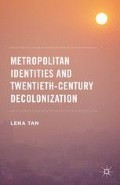Abstract
Rather than engaging in making definitive statements or conclusions regarding invariant cause and effect relations for decolonization that will encompass an entire universe of cases across time and space, this book has been focused on investigating how identity may be involved in the processes leading to decolonization. Hence, the discussion in this concluding chapter will be guided by the following questions: How do identity mechanisms and processes play a role in decolonization? What do the findings from the preceding two chapters tell us about the processes involved in decolonization? How do the findings contribute to our understanding of identity in international relations?
Access this chapter
Tax calculation will be finalised at checkout
Purchases are for personal use only
Preview
Unable to display preview. Download preview PDF.
Notes
Charles Tilly, Stories, Identities and Political Change (Lanham, MD: Rowman & Littlefield, 2002), 9.
Neta Crawford, Argument and Change in World Politics: Ethics, Decolonization and Humanitarian Intervention (Cambridge: Cambridge University Press, 2002)
Ian Lustick, Unsettled Lands, Disputed States: Britain and Ireland, France and Algeria, Israel and the West Bank-Gaza (Ithaca, NY: Cornell University Press, 1993)
Robert Jackson, “The Weight of Ideas in Decolonization: Normative Change in International Relations,” in Ideas and Foreign Policy: Beliefs, Institutions and Political Change, eds. Judith Goldstein and Robert Keohane (New York: Columbia University Press, 1998)
Daniel Philpott, Revolutions in Sovereignty: How Ideas Shaped Modern International Relations (Princeton, NJ: Princeton University Press, 2001).
Martha Finnemore and Kathryn Sikkink, “International Norm Dynamics and Political Change,” International Organization 52, no. 4 (1998): 887–917
Martha Finnemore, National Interests in International Society (Ithaca, NY: Cornell University Press, 1996)
Margaret Keck and Kathryn Sikkink, Activists beyond Borders (Ithaca, NY: Cornell University Press, 1998).
I borrow the term “monster period” from James Der Derian, “Post-Theory: The Eternal Return of Ethics in International Relations,” in New Thinking in International Relations Theory, eds. Michael Doyle and G. John Ikenberry (Boulder, CO: Westview Press, 1997).
Brad Simpson, “‘Illegally and Beautifully’: The United States, the Indonesian Invasion of East Timor and the International Community, 1974–76,” Cold War History 5, no. 3 (2005): 303.
Frank Heinlein, British Government Policy and Decolonization, 1945–1963: Scrutinizing the Official Mind (London: Frank Cass, 2002).
Todd Shepard, The Invention of Decolonization: The Algerian War and the Remaking of France (Ithaca, NY: Cornell University Press, 2006).
Ted Hopf, Social Construction of International Politics: Identities and Foreign Policies, Moscow 1955 & 1999 (Ithaca, NY: Cornell University, 2002), 289.
See Edward Said, Culture and Imperialism (New York: Knopf, 1993).
Patricia M. Goff and Kevin C. Dunn, eds., Identity and Global Politics: Empirical and Theoretical Elaborations (New York: Palgrave Macmillan, 2004), 244.
Erik Ringmar, Identity, Interest and Action: A Cultural Explanation of Sweden’s Intervention in the Thirty Years War (Cambridge: Cambridge University Press, 1996), 3.
Janice Bially Mattern, Ordering International Politics: Identity, Crisis and Representational Force (New York: Routledge, 2005), 9.
Copyright information
© 2015 Lena Tan
About this chapter
Cite this chapter
Tan, L. (2015). Conclusion: Identity, Decolonization, and International Relations. In: Metropolitan Identities and Twentieth-Century Decolonization. Palgrave Macmillan, New York. https://doi.org/10.1057/9781137548887_4
Download citation
DOI: https://doi.org/10.1057/9781137548887_4
Publisher Name: Palgrave Macmillan, New York
Print ISBN: 978-1-137-55428-4
Online ISBN: 978-1-137-54888-7
eBook Packages: Palgrave Religion & Philosophy CollectionPhilosophy and Religion (R0)

